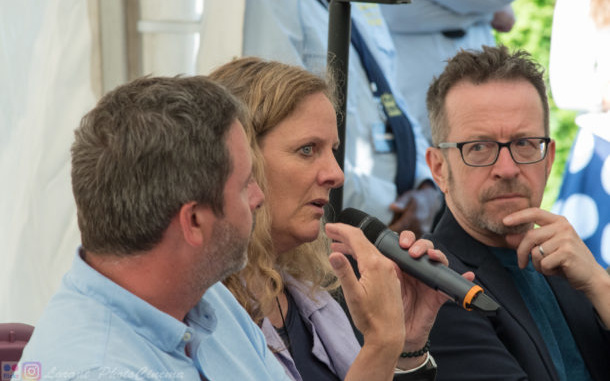Piers Robinson (L) and Tim Hayward (R) of the “Working Group on Syria, Propaganda, and Media” with Vanessa Beeley, a blogger working with Syria’s Assad regime, at a “Media on Trial” event, Leeds, UK, May 2018
Nerma Jelacic writes for Index on Censorship:
Thirty years separate the beginnings of conflicts in Bosnia-Herzegovina, where I come from, and Syria, where I work now. Bosnia and Syria are the bookends that encompass the three decades when we lived in a world where our collective conscience, eventually, recognised we had a responsibility to protect the innocent, to bring those responsible for war crimes to justice, and to fight against revisionism and denial. Whereas the Bosnian tragedy of the 1990s marked the (re)birth of these values, the Syrian carnage has all but put an end to them.
Nowhere is this sad fact more apparent than in the expansion of disinformation, revisionism and denial about the crimes perpetrated by the Syrian regime against its own people. As a result, disinformation campaigns have become increasingly vicious, targeting survivors, individuals and organizations working in conflict zones. Coddled by the ever-expanding parachute of academic freedom and freedom of expression, these unrelenting smear campaigns have ruined, endangered and taken lives. They have eroded trust in institutions, democratic processes and the media and sown division in fragmenting democratic societies. Their destabilising effect on democratic principles has already led to incitement to violence. Left unchecked, it can only get worse.
The disinformation movement has brought together a diverse coalition of leftists, communists, racists, ideologues, anti-Semites and fascists. Amplified by social media, their Nietzschean contempt for facts completes the postmodernist assault on the truth. But more important than the philosophical effect is the fact that disinformation campaigns have been politically weaponised by Russia. Under the flag of freedom of expression, they have become a dangerous tool in information warfare.
I know this, because I am one of their targets.
See also UK Academic on “Syria Working Group” Asked for Help from “Russian Spy”
Earlier this year, the Commission for International Justice and Accountability (CIJA), an NGO of which I am one of the directors, flung itself into the eye of the Syria disinformation storm by exposing the nefarious nature of the Working Group on Syria, Propaganda and Media (WGSPM), an outfit comprising mainly UK academics and bloggers.
The CIJA investigation revealed that, far from being fringe conspiracists, these revisionists, employed by some of the UK’s top universities, were collaborating with Russian diplomats in four countries; were willing to co-operate with presumed Russian security agents to advance their agenda and to attack their opponents; were co-ordinating dissemination of disinformation with bloggers, alternative media and Russian state media; appeared to be planning the doxxing of survivors of chemical attacks; and admitted to making up sources and facts when necessary to advance their cause.
The UK Academics Helping Russia Deny Assad’s War Crimes
Are Academics at UK Universities Pushing Pro-Assad Propaganda and Disinformation?
The investigation was a step out of my organization’s usual focus. For almost a decade, CIJA has been working (quietly and covertly) inside Syria to collect evidence necessary to establish the responsibility of high-ranking officials for the plethora of crimes that have become a staple of daily news. More than one million pages of documents produced by the Syrian regime and extremist Islamist groups sit in CIJA’s vaults and inform criminal investigations by European and American law enforcement and UN bodies. These documents tell, in the organisers’ and perpetrators’ own words, a deplorable story of a pre-planned campaign of murder, torture and persecution, a story that started in 2011 when the Syrian regime began its systematic and violent crackdown on protesters.
CIJA’s work is pioneering and painfully necessary as it ensures crucial evidence is secured, analysed and properly stored when there is no political will or ability to engage official public bodies to investigate the crimes. Our evidence has been described by international criminal justice experts to be stronger than that available to Allied powers holding the Nazi leadership to account during the Nuremberg trials. This makes us dangerous and this makes us a target – both in the theatre of war and in the war on the truth.
Before long, we were in the crosshairs of apologists for Syrian president Bashar al-Assad and, soon after that, in those of the Russian-sponsored disinformation networks.


Where is the part of CIA & American , uk & France on war against humanity in Iraq , Syria & around the world .where Us or western commercial interest take precedent over the people of the country where they went to war . Why no mentioned of weapon of mass destruction which was never found in Iraq . You think Libya is better then it was under the previous government . Western power just stay out of Asia , we clearly do not need your present . 1 million Uyghurs in concentration camp – how much per day is needed just to feed 1 million people , your western media did even do your math with mass propaganda. Shame so called true journalism
Anonymous,
Unclear how any of this is relevant to Nerma Jelacic’s examination of Syria, with Bosnia as background context, but thank you for writing.
S.
Can’t really report the actual truth when the governments don’t allow it. I was banned from facebook for posting actual footage of Gaza in 2014. What is true journalism without critical thinking? Media is one sided n controlled by the governments. Where was the news footage of innocent people being killed, raped n tortured in Myanmar by peaceful Buddhists? Sleeping of course.. where’s the coverage of the imprisonment, torture, rape and killings going on in China.. oh governments won’t allow the truth.. keep writing what the check signers want you to write.. no truth in media.. all BS n one sided.
Anonymous,
These cases can be discussed, but the post for consideration here is about Syria and disinformation.
S.